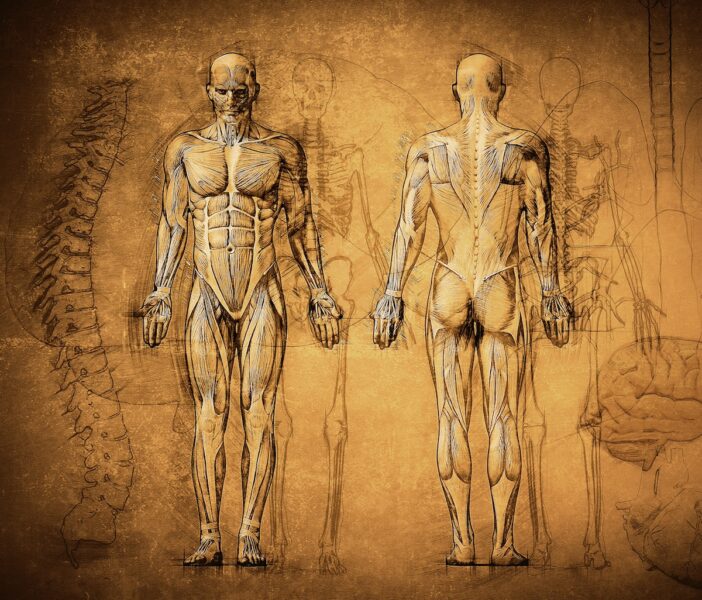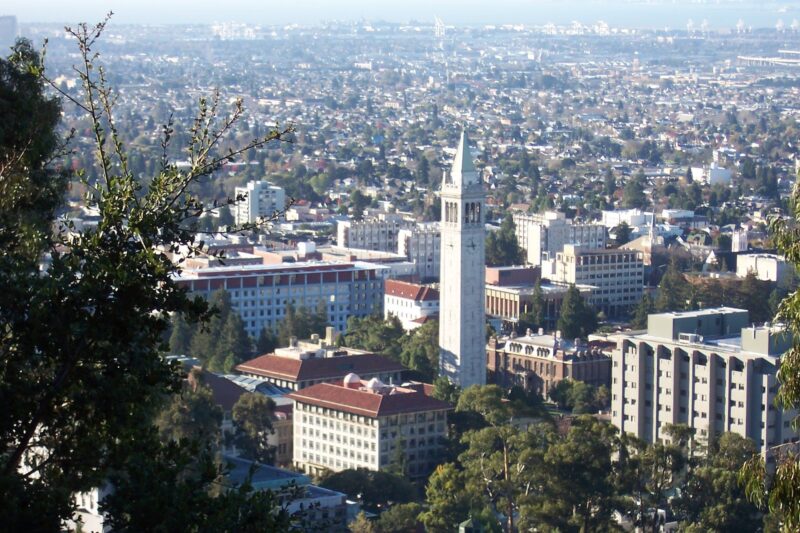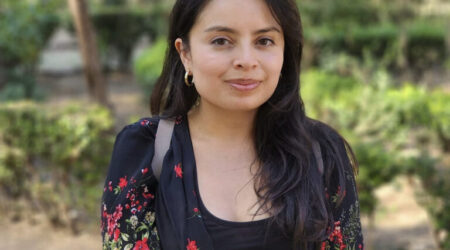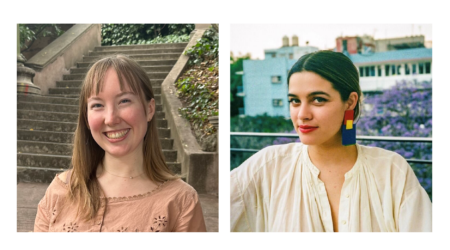Social Science Matrix will welcome seven new Matrix Research Teams for the 2024-2025 academic year. Matrix Research Teams are groups of scholars who gather regularly to explore or develop a novel question or emerging field in the social sciences. The teams convene participants from multiple disciplines and focus on research questions with real-world significance; they are designed to encourage collaboration among graduate students, provide professional development, and create opportunities for faculty engagement and mentorship.
This year’s funded teams — three faculty-led team and four graduate student-led teams — will address diverse social science topics, including industrial policy, computational social science, data mining and algorithms, and the language of biomedicine.
“The research teams are the heart and soul of Matrix,” says Marion Fourcade, Professor of Sociology and Faculty Director of Social Science Matrix. “Like their predecessors, the scholars receiving our funding for 2024-25 are poised to push boundaries with their innovative research while cultivating cross-disciplinary partnerships across the university. We take great pride in supporting their research.”
Matrix Research Teams are chosen following review by a cross-disciplinary panel of faculty members. Faculty-led teams receive $5000 in funding and hold regular meetings focused on a defined research problem, with a goal to apply for one or more grants for continued research. The student-led teams will receive up to $1500 to explore a new area or question of inquiry, in part to assess whether it has potential for further investigation. In addition to funding, all Matrix Research Teams receive support in coordinating, scheduling, and reserving space for meetings and events. Matrix also provides communications support to help publicize each group’s work, as well as assistance with identifying and applying for further funding.
Below are summaries describing the 2024-2025 Matrix Research Teams, based on the teams’ proposals.
Faculty-Led Research Teams
 The Case of the Human: A Transdisciplinary Research Team
The Case of the Human: A Transdisciplinary Research Team
Team leaders: Seth Holmes, Chancellor’s Professor, Medical Anthropology; Jeremy Gottlieb, MD/PhD student, Medical Anthropology; Theo Michaels, MD/PhD student, Medical Anthropology
Between the social sciences and medicine there exist numerous definitions of the human, from varying perspectives and with different political implications. Critical knowledge produced by the social sciences has engendered new terminology, programs, and practices in medicine that elucidate the social inequities in health and health care. While it is clear that the social sciences should be integral to medicine, the social sciences continue to vary in their understandings of “the human” in relation to health. The Case of the Human follows this importance and difference. We ask: “What do the social sciences bring to medicine’s conceptualization of ‘the human’? And how is the category of the human acted on in the sphere of health and health care?”
We answer these questions by generating novel, interdisciplinary, and diverse knowledge on the human along three important axes: the human as body, as social, and as subject. We bring together a community of scholars from across the social sciences in the service of our three key aims, each involving specific outputs: 1) co-developing knowledge on the human, through a multidisciplinary research conference co-sponsored by our UC-Berkeley Social Science Matrix Research Team; 2) disseminating new social scientific knowledges on the human, through a collaborative case series published in The Lancet; and 3) fostering an interdisciplinary community of social scientific scholars engaged in questions of the human, health, and medicine. Our multidisciplinary approach promises to transcend the boundaries separating the different social sciences, as well as the social sciences and health.
 Computational Social Science Research Team
Computational Social Science Research Team
Team leaders: David Harding, Professor of Sociology; Philip Stark, Professor of Statistics
The Computational Social Science Research Team will bring together faculty, graduate students, and other researchers from both social science and data science disciplines (e.g. Statistics, Computer Science) to explore potential strategies for further developing computational social science research and graduate training at UC Berkeley. The nascent field of computational social science encompasses research on social science research questions that leverages computational methods and resources, from machine learning to natural language processing to network analysis to “big data” and beyond. Computational social science also involves the consideration of the ethical and social implications of the use of artificial intelligence and big data for research, policy, and commerce.
Our Matrix Research Team has the following three interrelated goals that will create lasting impact at UC Berkeley and beyond: (1) Build a multidisciplinary community with the capacity to communicate and collaborate across fields; (2) Identify collaborative research projects for development of external funding applications; and (3) Design a “Designated Emphasis” (DE) in Computational Social Science for PhD students at Berkeley. We will accomplish these goals through weekly team meetings, informed by a regular external speaker series.

The Social Effects and Normativity of Data-Mining, Algorithms and the Digital Economy Research Team
Team leaders: Sarah Song, the Milo Rees Robbins Chair in Legal Ethics Professor of Law, Professor of Philosophy and Political Science; Isabella Luisa Mariani, Graduate Student, Jurisprudence and Social Policy, Berkeley Law
The digital economy has penetrated nearly every aspect of our social and political lives. Our research seeks to examine the effects of this prolific phenomenon on our social and personal development, our ability to access basic needs like healthcare, and our political and legal institutions and culture. Specifically, we will examine the connection between data mining and algorithmic systems integral to online platforms with outcomes across public and private sectors. These sectors include private health insurance, online esports, marketing, and political and legal discourse.
We seek to understand what the mining of personal data and the construction of algorithms (including predictive algorithms) mean for our political community, considering issues of political radicalization, social and emotional development, access to basic needs, and epistemic and political rights such as freedom of speech and privacy.
Our approach is interdisciplinary in that we consider perspectives from Sociology, Political Science, Law, Philosophy, and Political Economy to address the social, political, and normative implications of the digital economy. Weaving these perspectives and their respective methodologies will enable us to grapple with the vast effects of the rise of digitality and the exploitation of personal data that sustains the digital economy, and what potential solutions private actors, politicians, and lawmakers have to address them.
Student-Led Teams
 Industrial Policy Research Team
Industrial Policy Research Team
Team leaders: Ari Benkler, PhD student, Political Science; Lucas Osborne, PhD student, Jurisprudence and Social Policy; Sarang Shah, PhD student, Political Science.
Industrial policy is an interdisciplinary policymaking approach that instrumentalizes specific markets as mechanisms for achieving economic and political outcomes. Effective industrial policies make constructive use of findings from sociology, political science, economics, law, and other fields to plot the feedback between and co-constitution of the state and markets. An interdisciplinary approach could potentially transform this field by weaving the threads of diverse disciplines, and their analytical frameworks and methods, into a tighter, more cohesive, and more targeted bundle. Industrial policymaking is more than a subject of disciplinary study, but potentially a site for disciplinary formation around specific policy areas, such as climate change or housing. There may be opportunities in iterating on novel approaches and methodologies by synthesizing and applying the various disciplinary contributions. The aim of this research space is to bring useful contributions to the space of governance at a time in which the challenges we may address in doing so has never been more urgent.

Legal Geography Research Team
Team leaders: Andrea Lara-Garcia, PhD student, Geography; and Ralph Madlalate, PhD student, Jurisprudence and Social Policy
Contemporary social challenges such as widespread evictions, border militarization, migration and global climate change highlight the interconnections between legal ordering and spatial phenomena in shaping societal outcomes. In this context the boundaries between law, geography, and other disciplines continues to blur; such that there is a growing need to understand the complex interplay between legal frameworks, social relations, and geographical landscapes.
This research team aims to bring together graduate students from various fields, including law, urban planning, geography, and beyond, to foster a vibrant exchange of ideas on contemporary spatial and legal challenges. By delving into the intersection of law and geography–both through analyzing classical and foundational texts as well as drawing on critical perspectives in postcolonial studies, feminist geographies, and critical legal studies–we aim to uncover new perspectives, challenge conventional wisdom, and chart innovative pathways for research and scholarship. Our inquiry is motivated by the recognition that legal frameworks are not neutral instruments of governance, but are embedded within broader social, spatial, and economic contexts that (re)produce injustice. Ultimately, we believe that by critically interrogating the spatial dimensions of law, we can contribute to efforts aimed at creating more just, equitable, and inclusive spaces for all.
Tox-Ecologies Collective Research Team
Team leaders: Jasmine Martin, PhD student, Geography; Jimena Perez, PhD student, Geography
The Tox-Ecologies Collective grapples with the enduring legacies of colonialism and capitalism, the continued uneven restructuring of our material and relational worlds, and the altered forms of life and sociality that emerge within these affected spaces (Murphy, 2017). We turn to methodology to find the “words, protocols, and methods that might honor the inseparability of bodies and land, and at the same time grapple with the expansive chemical relations” (Murphy, 2017). Since the late 2000s, epistemological and theoretical interventions across critical disability studies, Indigenous STS, and racial geographies have catalyzed new ways of seeing ourselves and toxins and have provided new grammars for understanding and narrating environmental harm, which in turn has offered more creative horizons of possibility. Our group aims to trace these interventions, as well as find new language and analytic methods to think through our ecological entanglements—beyond a mathematics of damage and a framework that still holds out hope for an uncontaminated future. How we study relational entanglements influences what political demands we make and what obligations we have to each other (Thomas, 2019; Liboiron, 2021b). The Tox-Ecologies Collective is invested in asking what methods might be used to attend to how contamination and pollution alters our bodies and worlds and what new relations are made possible when we develop new analytic frames to understand our contemporary planetary conditions. The Collective’s activities include: a year-long reading and methods-practice group; a Spring 2025 writing workshop with the goal of a published, collaborative paper; and a Spring 2025 Symposium.
The Zones of Incommunicability and Biomedicine Research Team
Team leaders: Mark Williams Jr., PhD student, Medical Anthropology
It’s time to start over. Our is world saturated with toxic discourses on what it means to be healthy, what constitutes acceptable forms of care, and how to gain access to it. The interplay between language, health, and biomedicine has significant implications for public health outcomes, community development, and individual growth. Increasingly this has meant that everyday forms of communication, whether mundane or spectacular, have become potent sites of life and death. The Zones of Incommunicability and Biomedicine Research Team seeks to analyze how linguistic practices and biomedical knowledge come together to shape health behaviors, policies, and forms of care for some populations while constructing others as unworthy of it. We come together as medical anthropologists, linguists, public health researchers, artists, physicians, journalists and scholars in education, disability studies, black studies, and education to shed light on the power dynamics and cultural narratives that undergird the health and biomedical landscape. We track how language and communication within and outside of biomedical contexts influence the political economy of health resources and services, the experience of patients and practitioners, and broader social understandings of health, illness, and well-being. As a team we seek to launch an experimental, collective effort to radically recast old tools and create new ones that tinker with the conceptual building blocks of language, communication, poetics, interaction, narrative, translation, mediatization, health, and medicine, using them as provocations for unlearning and creating a radically decolonial framework.



